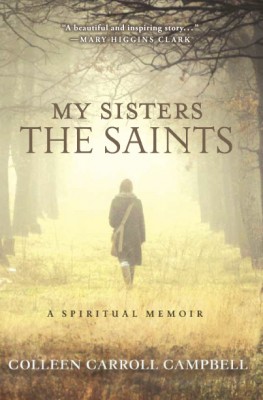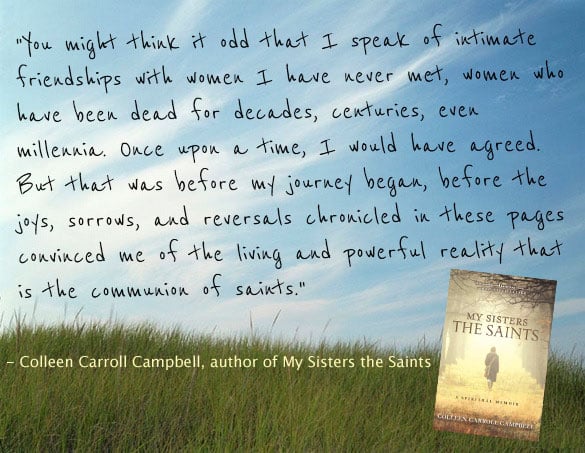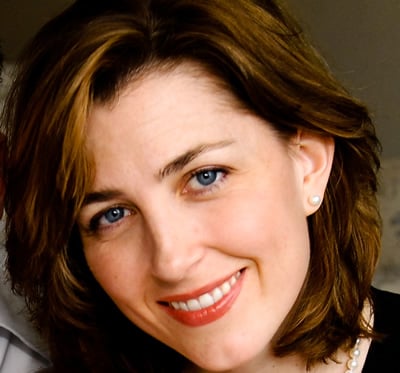Recently, I had the opportunity to read a book that really shook me. It’s not often that I find myself loving a memoir, but the latest by Colleen Carroll Campbell, My Sisters the Saints: A Spiritual Memoir (Image Books, 2012) did just that. (My full review is here, if you're interested.)
Enjoying the book so much made my recent conversation with Colleen even better. She graciously took the time out of her busy schedule to answer a few questions for readers here at CatholicMom.com as part of her book's blog tour.
If you're not familiar with her, Colleen’s an author, columnist, television and radio host and former presidential speechwriter. You’ll find her writing op-ed columns and covering breaking news.
Be sure to read all the way to the end for a lovely excerpt from the book. And remember, purchases done through our affiliate links here support the work we're doing here at CatholicMom.com.
Your new book on the saints is a keeper, Colleen! What inspired you to collect your own memoir in a tapestry with female saints?
My Sisters the Saints began as a much less personal book. It was originally a more academic treatise, an essay-style exploration of the “feminine genius” and “new feminism” outlined by the late Blessed Pope John Paul II. It took many twists and turns, and several unsatisfying drafts, before I finally realized why the manuscript was leaving me cold. I was trying to convey the truths I had learned – about God, myself and my identity as a woman – from the way I had learned them. That way was not through arguments. It was through stories: the stories of the Church’s holy women whose joys, sorrows, stumbles and breakthroughs had helped me understand and navigate my own. So I wound up writing a spiritual memoir that interwove my own spiritual journey with the stories of six women saints who helped me on my way.
You speak of searching for meaning and this book being an answer to that. How did the saints accompany you as you wrote this book?
The saints are always with me. They are always with all of us, actually, but the trick is remembering and recognizing our connectedness in the Body of Christ – a connectedness that is not bound by time or space.
Most of the saints I write about in My Sisters the Saints were themselves writers of spiritual memoirs or autobiographies, in one form or another, so I drew a great deal of inspiration from them as I embarked on this intensely personal way of writing.
It’s risky to tell your own story, to reveal your interior self, warts and all. But what I learned from women like Teresa of Avila, Therese of Lisieux, and the others is that, in the end, it’s really not about you anyway. It’s about what God has done in your life. So sharing our spiritual struggles in a frank, transparent way can be an expression of gratitude to God and confidence in his mercy. It can also be a way to strengthen others who are journeying alongside us. I think all of us want to know that when we question or hurt or simply wonder at God’s mysterious ways in our lives, we are not alone.
What was the biggest surprise you found as you started researching the lives of the women saints and relating it to your modern challenges? How did your research change your faith journey?
I didn’t set out to research the saints’ lives per se. As I explain in the opening scene of My Sisters the Saints – where the reader finds me in college, battling a hangover as I dangle my legs out my apartment window and survey the detritus of the campus party scene below – this journey was not terribly intentional or organized at its outset. I simply found myself feeling empty, dry, out of answers, and distant from God.
After years of putting my faith on the back burner, I reluctantly – and very surreptitiously – began to pay attention to it again. And what drew me back in were the lives and writings of the women saints. So I suppose you could say that was the biggest surprise: that the stories of these women, many of whom had been dead for decades or centuries before I was born, spoke so powerfully to my contemporary questions.
Colleen, as you examined yourself in light of these amazing women saints, how did you find yourself inspired to strive more for spiritual motherhood? Did that begin to take shape for you in a new way? Can you speak to that?
Yes, in the course of my journey, I was absolutely inspired – and challenged and humbled – by these holy women and the way they manifested spiritual motherhood.
The writings of St. Edith Stein on this topic particularly resonated with me as I journeyed through infertility, which is one of the major threads in this book. Realizing that I might never bear biological children forced me to ask all sorts of difficult questions about what it means to be a woman, and especially, a woman who bears fruit in the kingdom of God.
Edith – her life and her writings – helped me to recognize that every woman is called to be a mother, and every woman can answer that call regardless of her circumstances. It’s just a matter of opening our eyes to the opportunities all around us. That doesn’t erase the pain of childlessness. But for women dealing with fertility struggles, the cultivation and emphasis on spiritual maternity can be a lifesaver. It’s a lot more encouraging than the just-relax, just-pray, here’s-some-baby-dust, you’ll-conceive-any-day-now admonitions to which infertile women are so often subjected. And even for women who eventually become biological, adoptive or foster mothers, it’s crucial to understand and appreciate spiritual motherhood – the truth that a woman’s gift for nurturing growth in others is meant to be shared selflessly, with an eye toward eternity.
How has this writing experience colored and impacted your own femininity and motherhood? What advice do you have to share with our audience here at CatholicMom.com?
I can truly say that the women saints have taught me what it means to be a woman and a mother. They, more than anyone else, have shown me what it looks like to be a liberated, fully alive, joyful woman of God.
Don’t get me wrong. I’m not saying I’ve achieved what they have, not by a long shot. But after the journey I recounted in My Sisters the Saints – a journey that is still ongoing – I do know this: Jesus is the true liberator of women. And the closer a woman draws to him, the more closely she imitates the generous self-surrender and audacious trust modeled by his mother, the more likely she is to know true liberation.
It’s the kind of liberation that does not depend on external circumstances and therefore can survive even the harshest trials. It’s the interior freedom granted by God alone. The women saints knew it. And the more we read their works, seek their intercession and learn from their examples, the more we can know it ourselves.
--
Excerpt from Chapter 4 of My Sisters the Saints, by Colleen Carroll Campbell (Image Books, 2012)
Edith’s insights resonated deeply with me, opening my eyes to truths I had intuited for years but never put into words. I found them especially helpful in making sense of my maternal desires and sorrow over infertility. Finally, I had found someone who took seriously my desperation to conceive a child in my womb, who saw my yearning for biological motherhood as a reasonable response to the way God had fashioned me, physically and spiritually. Edith’s observations about the close connection between a woman’s body and her soul helped me understand why I found it more difficult than John to ignore or compartmentalize our fertility troubles. My monthly periods, and the subtle changes I noticed in my body all month long, kept me continually conscious of the fact that I was not pregnant.
Even as Edith’s views validated my suffering, they challenged me to rethink my fixation on getting pregnant. If motherhood is more about what’s in your heart than what’s in your womb, I needed to stop waiting for a baby to use my maternal gifts. I needed to start recognizing the opportunities I already had to nurture growth in others, defend the vulnerable, and make the world a more loving, humane place.
The prospect frightened me. Since John and I received our first dose of bad news on the fertility front, I had careened between mourning my maternal desires and fighting to suppress them. My frustration at our failure to conceive had often led me to neglect prayer and escape into the excesses Edith warned against: superficiality, covetousness, and the pursuit of prestige.
My escapes took subtle forms. I would spend a few weeks quietly fixating on my weight and clothes, bitterly deciding that if my body could not produce a baby, it must be thinner, sexier, and more stunning than all those bodies that could. I would immerse myself in lavish travel plans, concluding that if John and I were going to be perceived as materialistic yuppies with no interest in children, we might as well play the part. I would dive into my work, not with the sense of duty and balance Edith extolled but with the explicit intention of working too many hours, garnering too many accolades, and earning too much applause to feel the pain of missing out on motherhood—or to feel much of anything, for that matter. None of my escapes lasted for long. I always wound up back at square one, weeping in the bathroom over that accursed pregnancy stick.
The strategies Edith suggested for coping with trials made more sense. I knew from experience that turning my mind to work helped when I found myself mired in self-pity, provided I maintained the balance between prayer, work, and rest that Edith advocated. The sacraments had been a source of strength to me for years, but Edith’s concrete suggestions about prayer reminded me to check in with Jesus throughout the day just as I checked in with John. Her warning against false idols particularly hit home, as I realized that the child I wanted so badly had become one for me.
I began to watch for openings to exercise spiritual maternity in my own life. I did not have to look far. The more active role I had taken in my father’s care allowed me to practice plenty of patience and nurturing. I finally understood the source of that satisfaction that filled me those times that I held Dad’s hand as he walked unsteadily, combed his thinning hair when he had forgotten, and encouraged him as he read to me, for the umpteenth time, an excerpt of scripture from the breviary page he had forgotten to turn. For so long, I had assumed that caring for Dad had nothing to do with longing for motherhood, even though my sorrow over infertility curiously abated whenever I visited my father. Now I realized that while I had been giving Dad my attention, he had been giving me an experience of motherhood. […]
Excerpted from My Sisters the Saints by Colleen Carroll Campbell Copyright © 2012 by Colleen Carroll Campbell. Excerpted by permission of Image Books, a division of Random House, Inc. All rights reserved. No part of this excerpt may be reproduced or reprinted without permission in writing from the publisher.
--
You can learn more about Colleen and the vast array of work she does at her website.
Copyright 2013, Sarah Reinhard
About the Author

Sarah Reinhard
When she’s not chasing kids, chugging coffee, or juggling work, Sarah Reinhard’s usually trying to stay up read just one … more … chapter. She writes and works in the midst of rural farm life with little ones underfoot. She is part of the team for the award-winning Catholic Mom’s Prayer Companion, as well as the author of a number of books.






.png?width=1806&height=731&name=CatholicMom_hcfm_logo1_pos_871c_2728c%20(002).png)
Comments